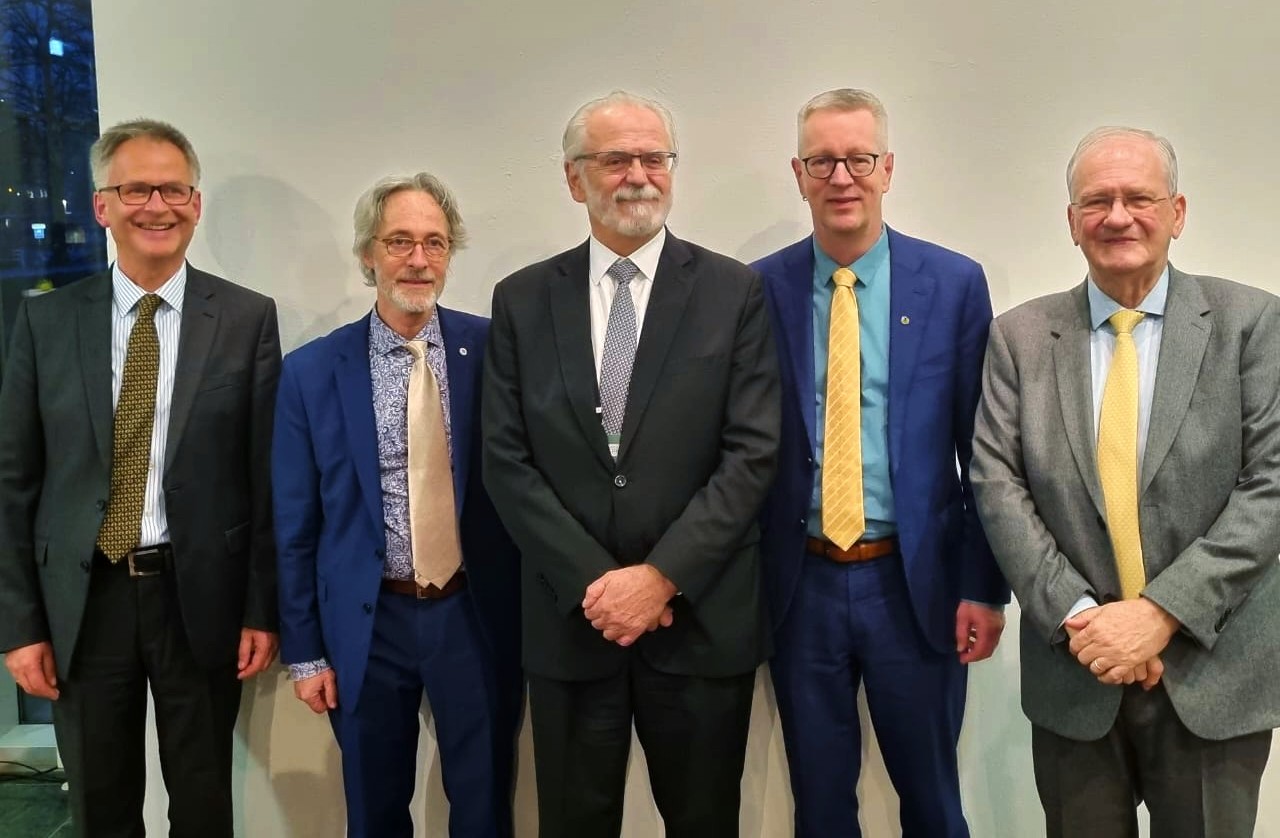

The Brazilian Ambassador to Germany (center), Roberto Jaguaribe, promoted a reception for the participants of FAPESP Week Germany (photo: Elton Alisson/Agência FAPESP)
This assessment was made by the Brazilian Ambassador to Germany, Roberto Jaguaribe, during a reception for the participants of FAPESP Week Germany.
This assessment was made by the Brazilian Ambassador to Germany, Roberto Jaguaribe, during a reception for the participants of FAPESP Week Germany.

The Brazilian Ambassador to Germany (center), Roberto Jaguaribe, promoted a reception for the participants of FAPESP Week Germany (photo: Elton Alisson/Agência FAPESP)
By Elton Alisson, from Berlin | Agência FAPESP – Relations between Europe and South America – and especially with Brazil - are at a favorable moment, due to factors such as the free trade agreement between Mercosur and the European Union, signed in December 2024 and currently being approved. However, in order to take advantage of this window of opportunity and be competitive, Brazil must continue to expand scientific and technological cooperation with European partners.
This assessment was made by the Brazilian Ambassador to Germany, Roberto Jaguaribe, during the reception for the participants of FAPESP Week Germany, an event held from March 25 to 26 at the Free University of Berlin.
“We’re now experiencing a positive climate in relation to our economic and, more importantly, regional relations, which is related to various factors, such as climate change and the energy transition, as well as others linked to geopolitical movements. This new framework is making it clear that we need to come together in different ways, especially because we have very important convergences,” said Jaguaribe.
“We’re also hopefully in the final phase of a long-negotiated agreement between Mercosur and the European Union, with Germany being the driving force behind its approval. All of this will open new doors, but if we want to be competitive, we need to continue working to develop scientific and technological cooperation, as FAPESP has been doing and which will continue to be fundamental,” he observed.
According to the ambassador, scientific cooperation between Brazil and Germany has played a very important role in the relationship between the two countries, and collaboration with the state of São Paulo in this area has been very strong and deepened in recent years.
“FAPESP is the oldest Brazilian research funding institution and one of the most successful over the years. For this reason, it has developed a very important relationship abroad, including with Germany. We need to encourage the continuation of this valuable effort,” he noted.
According to Marco Antonio Zago, President of FAPESP, Germany is the fourth largest scientific partner of the state of São Paulo, in terms of articles co-authored by researchers associated with universities and research institutions in both regions. The aim of FAPESP Week Germany is to expand and strengthen this scientific and technological cooperation with the European country, he stressed.
“The state of São Paulo has three major partners in scientific collaboration here in Europe, which are Germany, the United Kingdom and France. And, in our opinion, the planning and implementation of cooperation requires face-to-face conversations. Researchers need to get to know their partners and talk to them in order to build relationships of trust and work together,” he said.
“I’m sure that science and technology can bring progress and a peaceful future, and we can do this together. That’s why we’re here,” Zago emphasized.
According to Dietrich Halm, Director of International Cooperation with Latin America at the German Research Foundation (DFG), both the institution and FAPESP, which are partners in organizing the event, are convinced that excellent research is only possible when international cooperation is made possible.
“In view of the new and risky geopolitical movements that are currently taking place, often accompanied by unplanned measures, it’s even more valuable that we have scientific and fact-based exchanges with our partners from Brazil during this event, in order to further strengthen cooperation between São Paulo, Brazil and Germany,” he concluded.
Read more about FAPESP Week Germany at: fapesp.br/week/2025/germany.
Republish
The Agency FAPESP licenses news via Creative Commons (CC-BY-NC-ND) so that they can be republished free of charge and in a simple way by other digital or printed vehicles. Agência FAPESP must be credited as the source of the content being republished and the name of the reporter (if any) must be attributed. Using the HMTL button below allows compliance with these rules, detailed in Digital Republishing Policy FAPESP.





